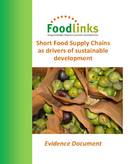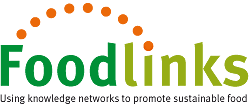Short Food Supply Chains
Short Food Supply Chains as drivers of sustainable development

This document provides evidences on the diversity of short food supply chains in Europe and their contribution to sustainable rural development.![]() Download version (4.8 MB)
Download version (4.8 MB)
Join us on the Knowledge Hub
What is a Community of Practice (CoP)?
A Community of Practice (CoP) is a group that evolves or is created specifically based on common interests in a particular field, with the goal of gaining knowledge related to that field. It is through the process of sharing information and experiences within the group that members learn from each other and have an opportunity to develop. Though this type of learning has been going on for centuries, spatial barriers have hindered this type of exchange and therefore new techniques will be experimented with in our project, such as online networking tools.
The three communities of practice the Foodlinks project is exploring have been created specifically for this project with the strong desire that these groups evolve and grow over the length of our project and beyond.
Community of Practice (CoP) Short Food Supply Chains (SFSC CoP)
Who are we?
The Community of Practice (CoP) on "Short Food Supply Chains" (SFSC CoP) encounters researchers, policy representatives and civil society actors that share a common interest and a practice in close(er) relationships between consumers and food supply chain actors.
What we do
- Developing a common understanding of what sustainable short food chains are;
- Prioritizing the most important aspects of sustainable short producer to consumer (P2C) food chains by considering the current political framing;
- Developing a reflection on how academic knowledge brokerage relates to policy relevant knowledge and how these relate to society, through knowledge brokerage activities;
- Creating a durable virtual brokerage platform and a stable network of researchers, policy makers and civil society actors interested in participating in research activities or influencing the research agenda setting.
How do we do it?
Our Community of Practice (CoP) is distributed around Europe, therefore it is challenged by limitations in terms of distance and lack of personal knowledge among members. A virtual CoP is established on the UK CoPs for Public Service web platform to overcome these limitations and allow continuous interaction among members by sharing documents, starting discussions, blogging, social bookmarking, videos and announcements about upcoming events. It is possible to sign into the CoP by visiting this link: https://knowledgehub.local.gov.uk/group/foodlinksshortproducertoconsumerfoodchains ![]() .
.
We held a webinar on the impact of regulations on short food supply chains:
“Hygiene rules on the hygiene of foodstuffs in Europe: Which challenges for small scale producers?”
Author: Elisa Bianco, Slow Food
Presentation with audio is available here: www.slideshare.net/francescagalli/hygiene-rules-challenges-for-small-scale/1/yes ![]()
We have identified priorities that need to be addressed in the domain of short food supply chains. The priorities identified are:
- Typologies of short food supply chains (SFSCs)
- Sustainability and health aspects of SFSCs
- Impact of the regulatory regime
- Organizational patters suitable for SFSCs
The discussion on these priorities is activating brokerage activities both within the CoP and beyond, in the light of the comparison among national realities and between different perspectives.
We have produced a joint document, in collaboration with policy makers, reserchers and civil society associations to present these priorites. The discussion is illustrated by 19 case studies drawn from experiences all around Europe.
“Short Food Supply Chains as drivers of sustainable development. Evidence Document.![]() Executive summary (679 KB)
Executive summary (679 KB)![]() Full Evidence Document (4.8 MB)
Full Evidence Document (4.8 MB)
Publications of the Community of Practice Short Producer to Consumer Food Supply Chains (Work package 3)
 Final Report CoP Short Food Supply Chains (4.3 MB)
Final Report CoP Short Food Supply Chains (4.3 MB) Short Food Supply Chains as drivers of sustainable development - Evidence document (4.8 MB)
Short Food Supply Chains as drivers of sustainable development - Evidence document (4.8 MB) Executive summary of the Eviddence document (679 KB)
Executive summary of the Eviddence document (679 KB) Short food supply chains as a policy tool (679 KB)
Short food supply chains as a policy tool (679 KB) Short food supply chains - Timeline from January 2011 to October 2013 (3.6 MB)
Short food supply chains - Timeline from January 2011 to October 2013 (3.6 MB)
More about the Cop Short Food Supply Chains
Examples
Links
- PureFood.eu: Supply chains

- Wikipedia.org: Short food supply chains

Contact
Francesca Galli, CoP coordinator, University of Pisa, Italy
 This website was archived on November 14, 2013 and is no longer updated.
This website was archived on November 14, 2013 and is no longer updated.


